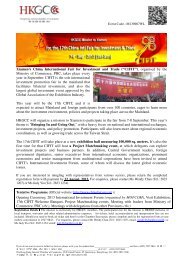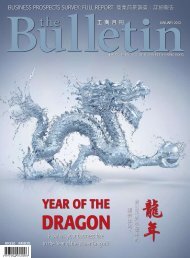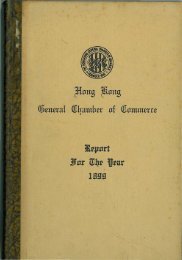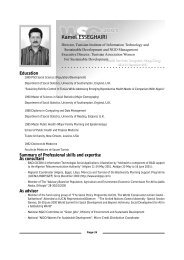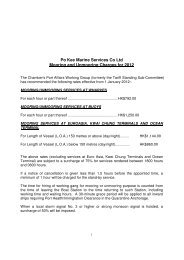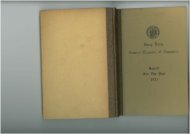æ¥é·è¯å°è¨ª - The Hong Kong General Chamber of Commerce
æ¥é·è¯å°è¨ª - The Hong Kong General Chamber of Commerce
æ¥é·è¯å°è¨ª - The Hong Kong General Chamber of Commerce
Create successful ePaper yourself
Turn your PDF publications into a flip-book with our unique Google optimized e-Paper software.
貿 易 改 革ReformsChina simplifies its Foreign Exchange Administration System for Trade in Goods,and scraps verification and reconciliation measures for export foreign exchangereceipts, writes Zhang Jian<strong>The</strong> Mainland has embarked on a nationwide reform programme<strong>of</strong> its foreign exchange administration systemfor trade in goods, which came into effect on August 1.<strong>The</strong> move was announced in a joint statement by the StateAdministration <strong>of</strong> Foreign Exchange, the <strong>General</strong> Administration<strong>of</strong> Customs, and the State Administration <strong>of</strong> Taxation. Itrepresents the nationwide enactment <strong>of</strong> the Announcement <strong>of</strong>Pilot Reform <strong>of</strong> the Foreign Exchange Administration Systemfor Trade in Goods (SAFE Announcement No.2 [2011], implementedon December 1, 2011), and simplifies procedures formany enterprises.Key pointsEnterprises are no longer required to undergo verificationand reconciliation procedures for foreign exchange receiptsfrom exports, or to submit the Export Verification Form forForeign Exchange Collection (Verification Form) when applyingfor export rebates.<strong>The</strong> foreign exchange administration system for trade ingoods has been changed from on-site verification and reconciliationon a case-by-case basis, to <strong>of</strong>f-site aggregate reconciliation.Moreover, enterprises no longer need to frequentlytravel between foreign exchange authorities and banks to filetheir applications.Through the Foreign Exchange Monitoring System forTrade in Goods, imports/exports, foreign exchange paymentsand receipts will be collected on a case-by-case basis. Enterprises’flow <strong>of</strong> goods and capital will be regularly comparedand evaluated, so any enterprises’ data that produces unusualfluctuations will be subject to on-site verification.Classification and management <strong>of</strong> enterprisesCategory A enterprises can arrange foreign exchange paymentsdirectly with their bank, with supporting documents– customs declarations, contracts, invoices, etc – which provethe authenticity <strong>of</strong> the transactions. Foreign exchange receiptsfor exports will not be subject to online inspections.Category B and C enterprises remain under strict supervision.Specifically, Category B enterprises are subject to electronicdata verification through banks, while Category Centerprises need prior registration with the foreign exchangeauthorities and will be treated on a case-by-case basis.Adjustment <strong>of</strong> customs declaration procedures andsimplification <strong>of</strong> export rebate vouchersFrom August 1, enterprises are no longer required to providethe Verification Form when making their export customsdeclaration, or export rebates. For export customs declarationsfiled before August 1, if the export foreign exchange verificationreceipt is not due, and it has not been verified or reconciledbefore July 31, 2012, companies do not need to providethe Verification Form when applying for export rebates. Casesbefore this date still need to observe the relevant rules and regulationsthat were in place before the reform came into place.Notes to enterprises<strong>The</strong> move greatly simplifies the procedures involving foreigntrade exchange payments and receipts for enterprises,which will also lower the administrative costs for banks. Withthe exemption <strong>of</strong> the Verification Form, the time required fortax rebate applications has been significantly shortened, whichwill also improve enterprises’ cash flow.Although scrutiny <strong>of</strong> applications seems to be more relaxed,it does not equate to non-supervision. Strict monitoring willbe conducted by the foreign exchange authorities if any abnormalityis detected in the Foreign Exchange Monitoring Systemfor Trade in Goods. <strong>The</strong>refore, companies should study therisks and improve their self-regulation mechanisms.<strong>The</strong> Bulletin 工 商 月 刊 September 2012 39



